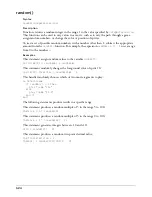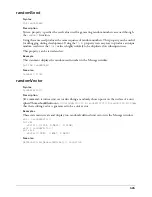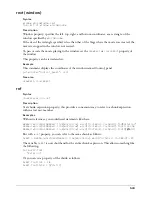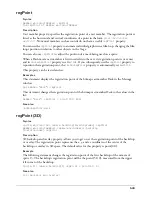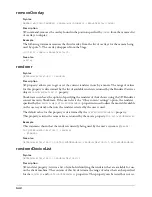
536
The
eventName
parameter can be any of the following predefined Lingo events, or any custom
event that you define:
•
#collideAny
is a collision event.
•
#collideWith
is a collision event involving this specific model. The
setCollisionCallback()
command is a shortcut for using the
registerScript()
command for the
#collideWith
event.
•
#animationStarted
and
#animationEnded
are notification events that occur when a bones or
keyframe animation starts or stops playing. The handler will receive three arguments:
eventName
,
motion
, and
time
. The
eventName
argument is either
#animationStarted
or
#animationEnded
. The
motion
argument is the name of the motion that has started or stopped
playing, and
time
is the current time of the motion.
For looping animations, the
#animationStarted
event is issued only for the first loop, not
for subsequent loops. During a blend of two animations, this event will be sent when the
blending begins.
When a series of animations is queued for the model and the animation’s
autoBlend
property is
set to
TRUE
, the
#animationEnded
event may occur before the apparent end of a given motion.
This is because the
autoBlend
property may make the motion appear to continue even though
the animation has completed as defined.
•
#timeMS
is a time event. The first
#timeMS
event occurs when the number of milliseconds
specified in the
begin
parameter have elapsed after
registerForEvent
is called. The
period
parameter determines the number of milliseconds between
#timeMS
events when the value of
repetitions
is greater then 0. If
repetitions
is 0, the
#timeMS
event occurs indefinitely.
The handler you specify is sent the following arguments:
type
is always 0.
delta
is the elapsed time in milliseconds since the last
#timeMS
event.
time
is the number of milliseconds since the first
#timeMS
event occurred. For example, if there
are three iterations with a period of 500 ms, the first iteration’s time will be 0, the second
iteration will be 500, and the third will be 1000.
duration
is the total number of milliseconds that will elapse between the
registerForEvent
call
and the last
#timeMS
event. For example, if there are five iterations with a period of 500 ms, the
duration is 2500 ms. For tasks with unlimited iterations, the duration is 0.
systemTime
is the absolute time in milliseconds since the Director movie started.
Note:
You can associate the registration of a script with a particular node rather than with a cast member by using
the
registerScript()
command.
Examples
This statement registers the
promptUser
event handler found in a movie script to be called twice at
an interval of 5 seconds:
member("Scene").registerForEvent(#timeMS, #promptUser, 0, \
5000, 5000, 2)
This statement registers the
promptUser
event handler found in a movie script to be called each
time a collision occurs within the cast member named Scene:
member("Scene").registerForEvent(#collideAny, #promptUser, 0)
Summary of Contents for DIRECTOR MX-LINGO DICTIONARY
Page 1: ...Lingo Dictionary Macromedia Director MX...
Page 756: ...Index 756...



